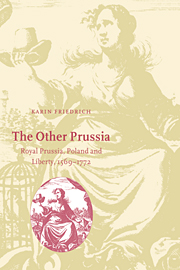Book contents
- Frontmatter
- Contents
- Preface
- Gazetteer
- Glossary
- List of abbreviations
- Map 1
- Map 2
- 1 Introduction
- 2 The origins of Royal Prussia
- 3 Royal Prussia and urban life in the Polish-Lithuanian Commonwealth
- 4 History, myth and historical identity
- 5 Political identity in the cities of Royal Prussia and the meaning of liberty (1650–1720)
- 6 Loyalty in times of war
- 7 Divergence: the construction of rival Prussian identities
- 8 Centre versus province: the Royal Prussian cities during the Great Northern War
- 9 Myths old and new: the Royal Prussian Enlightenment
- 10 Conclusion
- Bibliography
- Index
- CAMBRIDGE STUDIES IN EARLY MODERN HISTORY
9 - Myths old and new: the Royal Prussian Enlightenment
Published online by Cambridge University Press: 22 September 2009
- Frontmatter
- Contents
- Preface
- Gazetteer
- Glossary
- List of abbreviations
- Map 1
- Map 2
- 1 Introduction
- 2 The origins of Royal Prussia
- 3 Royal Prussia and urban life in the Polish-Lithuanian Commonwealth
- 4 History, myth and historical identity
- 5 Political identity in the cities of Royal Prussia and the meaning of liberty (1650–1720)
- 6 Loyalty in times of war
- 7 Divergence: the construction of rival Prussian identities
- 8 Centre versus province: the Royal Prussian cities during the Great Northern War
- 9 Myths old and new: the Royal Prussian Enlightenment
- 10 Conclusion
- Bibliography
- Index
- CAMBRIDGE STUDIES IN EARLY MODERN HISTORY
Summary
Enlightened Europe put little trust in Poland-Lithuania's ability to reform itself and abandon its main characteristics, the ‘fanaticism and sedition’, which according to Voltaire ‘always animate [this] sad nation’. Incompatible with the ideals of the Enlightenment, Polish Catholicism was associated with intolerance and ignorance and blamed for the downfall of what had once been the largest central European power. Polish historians have often been the most severe judges of the Commonwealth's last decades. They contrasted the universalism of the Enlightenment and its culmination in the Declaration of the Rights of Man with the ‘feudalism’ of the Polish nobility's Sarmatian culture, which had to make way for more enlightened cultures, superior powers, and their more effective social, military and political organisations. Such stereotypical views of the ‘culture of difference’ between East and West were further reinforced by the Tumult in Thorn and the opportunity it gave to Russia and Prussia, who for their own purposes activated their propaganda machines and organised the resistance of the so-called dissidents against the Catholic majority. The most vociferous and polemic contemporary critic of Polish culture and society was Frederick II of Prussia, who began to prepare the ground for the dismemberment of Poland-Lithuania in order to gain the important territorial bridge between Brandenburg, Pomerania and his East Prussian provinces from 1752 at the latest, when he wrote in his testament: ‘By right of political necessity, Royal [Polish] Prussia must be integrated into the Hohenzollern kingdom.’
- Type
- Chapter
- Information
- The Other PrussiaRoyal Prussia, Poland and Liberty, 1569–1772, pp. 189 - 216Publisher: Cambridge University PressPrint publication year: 2000



